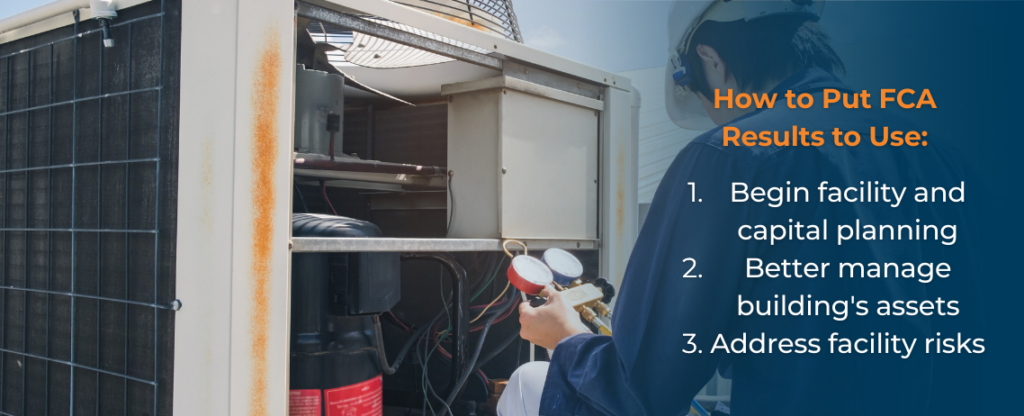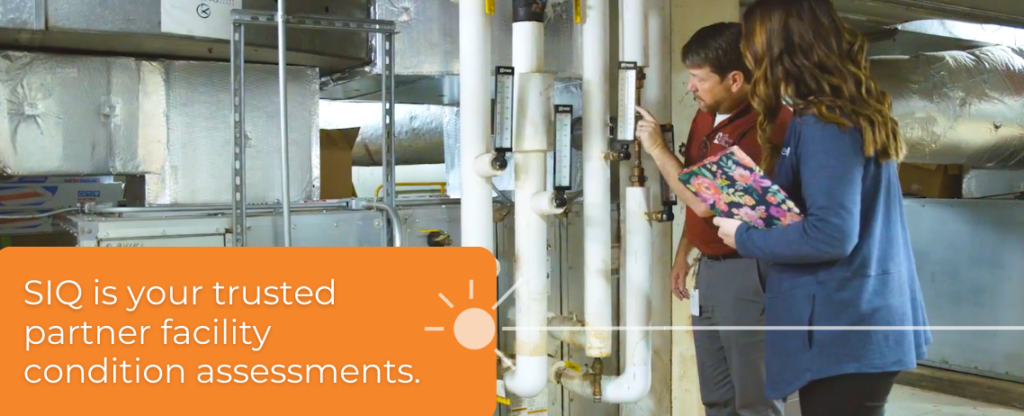
Whether you’re managing the facilities for a school district, college campus, municipality, local/state government, healthcare space or hospital, apartment building, warehouse, retail, hotel, the list could go on – you need to fully understand the current state of each building system within your real estate portfolio. The best way to thoroughly gather this information is with an asset inventory that feeds a facility condition assessment.
A facility condition assessment (FCA) analyzes a building’s condition as it relates to its age, design, construction methods, and systems. Typically conducted by an FCA specialized service provider, they include a review of documentation related to a building’s original construction, any renovations, and a physical site walkthrough to ensure the accuracy of as-built or as-is conditions. They often utilize capture technology to include typical elevations of the building’s exterior, site work, parking, roofing, structural systems, plumbing, HVAC, electrical systems, conveyance systems, life safety systems, and any specialized assets or systems.
How to Utilize the Results
When the FCA is complete, you’ll receive an in-depth condition report of your building, including photographic evidence of all findings. From building exteriors (roof, envelope, windows, doors) to interior materials (walls, floors, fixtures, ceilings), and mechanical, electrical, and plumbing systems used throughout, you’ll gain a better understanding of each. So how can you best start putting those results to use?

1. Begin facility and capital planning
The results of your FCA are a great foundation when developing strategic facility planning metrics such as system reliability, uptime, operability, maintainability, the total cost of ownership, life cycle costing, energy management, and master facilities planning. Understanding your building’s condition gives a measure of the effectiveness of your current capital renewal programs. These metrics help determine the remaining useful life of various components or systems and compare it with full economic life expectancies, given good maintenance practices. These results can help you better plan and prioritize routine or deferred capital renewal, energy savings projects, total replacement costs, maintenance optimization, and more.
2. Better manage your building’s assets
FCAs can also identify all assets, materials, and systems utilized in your building and the current performance state of each, especially those which are near or past their useful life and pose a risk for failure. For example, if stained ceiling tiles are present throughout multiple spaces within a building, further investigation can reveal a host of potentially larger problems, such as roofing failure, leaking sprinkler pipes, or uninsulated HVAC equipment.
The results of your FCA can also help you mitigate potential issues and stay ahead of challenging conversations with code officials that frequent buildings by identifying obstructed pathways, unclean mechanical rooms, and unsigned emergency exits.
3. Address risks in your facility
FCAs can identify risks present throughout both the exterior and interior of your building’s footprint and may lower the potential for litigation. Sidewalks, entrances, and exterior walkways that are uneven, damaged, or otherwise in poor condition could enable tripping hazards. Interior spaces that are not ADA compliant can introduce risks for individuals; this is especially important for K-12 schools and healthcare facilities to consider to protect the safety of students and patients.
A good FCA can also help with emergency planning and readiness efforts by verifying emergency annunciation technology, such as public address systems, security card readers, and cameras that are operable and in good working condition – helping mitigate further potential risks and ensure rapid response if a situation would arise.

How to Prepare for Your Next FCA
FCAs should be conducted on a regular basis, completed approximately every three years. You may also elect to conduct an FCA for a portion of your overall facility portfolio annually, depending on how many different buildings you manage.
Partnering with a service provider who specializes in FCAs, especially for a given industry or building type, can help ensure the accuracy, organization, and thoroughness of the results. An FCA team can be comprised of a stand-alone service provider or a combination of architectural, engineering, and energy efficiency experts, or an asset management firm. Firms with a multi-disciplinary approach and composition of team members with varying areas of expertise are best positioned to deliver the most effective FCA services and provide organizations with the necessary facility data to make strategic decisions.
Your FCA service provider will need to gather information about your building’s original construction and any renovations or upgrades that have been performed over its lifespan. Often, an estimate of probable costs associated with potential projects is developed to aid in budgeting and planning. Be sure to gather all documentation needed for this step, including:
- Warranty information
- Safety inspection records
- Records indicating the age of material building systems, such as the roof, chillers, boilers, electrical, etc.
- All previous FCA reports
- Pending proposals or contracts for equipment replacement
- A description of future improvements planned
- Americans with Disabilities Act survey and status of any improvements
- Drawings and specifications, including as-built or construction
Another aspect to consider when selecting a service provider is their level of forward-thinking technology to house and present information covering the facility’s construction and renovation history, maintenance, operations and utilities, and FCA findings. Such technology is also helpful for giving facility managers one place to assess their assets, evaluate potential investments, define long-term planning, measure facility performance, and ensure any projects conducted, especially those as a result of findings from a condition assessment, are efficient and achieve the organization’s goals.

FCAs are packed with a deeper insight into your facility and can help with capital planning, managing assets, and mitigating potential risks. It’s important to remember to schedule an assessment on a regular basis, typically every three years. Consider budgeting this work now versus waiting until your systems begin to fail to schedule your next FCA.
SitelogIQ is an expert in tailoring and conducting facility condition assessments to meet your specific needs to help you better understand the ins and outs of your space and plan accordingly to meet specific goals. As a national energy efficiency and facility solutions provider, we also offer mySiteIQ, a technology-enabled facility intelligence solution to house information covering the facility’s construction and renovation history, maintenance, operations and utilities, and FCA findings, among other lifecycle components. Contact our team today to learn more about facility condition assessments or to request a mySiteIQ demo.


